Basal Cell Carcinoma
What Is Basal Cell Carcinoma (BCC)? The Most Common Skin Cancer
Basal cell carcinoma (BCC) is the most prevalent form of skin cancer, responsible for the majority of skin cancer cases. It originates in the basal cells, which are located in the deepest layer of the epidermis, the outermost layer of the skin. While BCC is typically slow-growing and less aggressive than other skin cancers, it can still cause significant local tissue damage if not treated promptly.
Basal cell carcinomas can manifest in various forms on the skin, including red patches, pink growths, open sores, and shiny bumps. The primary cause of Basal cell carcinomas is overexposure to ultraviolet (UV) rays, often from the sun or tanning beds. Although BCC is rarely life-threatening when treated appropriately, early detection and treatment are crucial to prevent complications.
Each year, nearly three million people are diagnosed with BCC. This type of skin cancer is most common in individuals whose lifestyles involve excessive UV exposure. Although BCC is increasingly being diagnosed in younger people, it remains most prevalent in those over 40. Individuals with fair skin, blond or red hair, and blue, green, or grey eyes are particularly susceptible, as are men, who face a higher risk of developing the condition.
Examples of Basal Cell Carcinoma
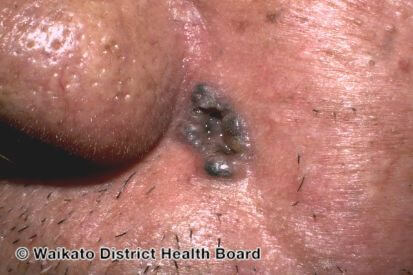
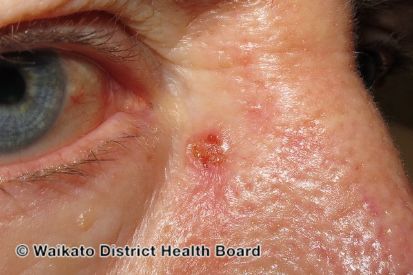
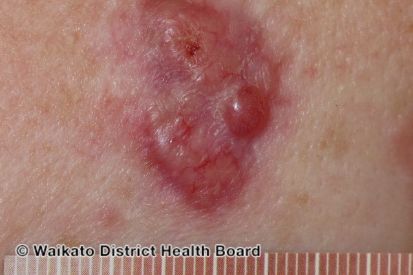
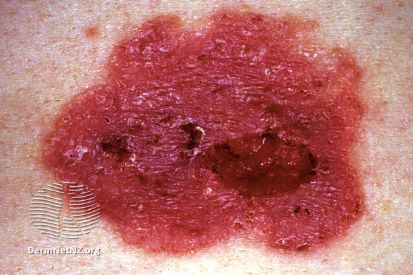
Symptoms of Basal Cell Carcinoma
Basal cell carcinoma (BCC) is the most common form of skin cancer and often develops in areas of the body that are frequently exposed to the sun. Basal cell carcinoma on the face is particularly common. Other frequent sites include the neck, scalp, and arms. Early-stage basal cell carcinoma can be subtle and may resemble non-threatening skin conditions.
BCC typically presents as slow-growing lesions that rarely cause pain but may become problematic over time if untreated. These lesions may look like shiny, pearly bumps, open sores that don’t heal, or flat, scar-like areas. It's essential to consult a dermatologist if you notice any persistent or changing spots on your skin.
Common signs and symptoms of BCC include:
- A pearly or waxy bump, often with visible blood vessels
- A flat, flesh-colored, or brown scar-like lesion
- An open sore that bleeds, oozes, or crusts and remains open for weeks
- A pink growth with a slightly raised, rolled border and a crusted indentation in the center
- A red patch that may itch or hurt
- Lesions developing on sun-exposed areas like the face, ears, neck, scalp, shoulders, and back
Causes of Basal Cell Carcinoma
The primary cause of BCC is prolonged exposure to ultraviolet (UV) radiation from the sun or tanning beds. Those over the age of 40 are also more susceptible to BCC. While anyone can develop it, certain risk factors increase the likelihood, including genetics and skin type.
Common causes of BCC include:
- Chronic sun exposure, especially as a child, without protection
- Use of tanning beds
- Fair skin, light eyes, and blond or red hair
- A history of severe sunburns, especially in childhood
- A family history of skin cancer
- Genetic conditions, such as basal cell nevus syndrome
- A weakened immune system due to illness or medication
Preventing Basal Cell Carcinoma
While basal cell cancer is most often caused by cumulative sun exposure, many cases can be prevented or caught early with the right habits. Practicing sun protection year-round and regular skin checks can help reduce risk. Understanding what BCC looks like, especially in the early stages, is critical for catching it before it becomes severe.
Common preventative measures include:
- Using a broad-spectrum sunscreen with SPF 30 or higher daily, even on cloudy days
- Avoiding sun exposure during peak hours (10 AM – 4 PM)
- Wearing protective clothing, wide-brimmed hats, and UV-blocking sunglasses when outdoors
- Staying in the shade whenever possible, especially during midday
- Avoiding tanning beds, which significantly increase skin cancer risk
- Performing regular self-skin checks and being aware of BCC symptoms, such as shiny bumps, open sores, or scar-like patches
- Learning to recognize what basal cell carcinoma looks like using credible resources and basal cell carcinoma pictures of the early stages
- Scheduling annual total body skin examinations with a dermatologist for professional screening
Basal Cell Carcinoma (BCC) FAQs
People with fair skin, a history of frequent sun exposure, or a family history of skin cancer are at a higher risk, though anyone can develop BCC.
Dermatologists diagnose BCC by examining the skin lesion and may perform a biopsy to confirm the presence of cancerous cells.
Yes, Mohs micrographic surgery is an effective treatment for Basal Cell Carcinoma (BCC). This specialized and precise technique is primarily used to remove skin cancers, especially in areas where preserving healthy tissue is vital, such as the face, ears, nose, and other cosmetically sensitive regions.
BCC can recur in the same area. Regular skin checks and follow-ups are crucial for early detection.
Continuing sun protection measures, regular self-examinations, and routine skin checks with a dermatologist are key to preventing recurrence.
A Total Body Skin Examination (TBSE) is a comprehensive evaluation of a person's skin from head to toe conducted by a dermatologist or healthcare professional. During this examination, the healthcare provider systematically inspects the skin, including areas that are not typically exposed to sunlight, to assess for any signs of skin cancer, abnormal moles, or other skin conditions.
The exam usually involves the patient removing all clothing and wearing a gown or drape provided by the healthcare professional. The dermatologist examines the skin, scalp, face, neck, trunk, arms, legs, hands, feet, fingernails, and toenails, checking for any suspicious lesions, moles, discolorations, or changes in existing moles or spots.
Patients are often encouraged to have regular Total Body Skin Exams, especially if they have a history of skin cancer, numerous moles, a family history of skin cancer, or if they spend significant time in the sun. These exams aid in the early detection and management of skin conditions, potentially improving outcomes and reducing the risk of complications associated with skin cancers.
From our QualDerm Family of Brands: Non-Melanoma Skin Cancers
How to Treat Basal Cell Carcinoma
Treatment for BCC depends on several factors, including the size, depth, and location of the lesion, as well as the patient’s overall health. With various effective approaches available, from surgical options to newer non-invasive therapies, it’s crucial to tailor the treatment to each case. Early intervention can improve outcomes and minimize scarring. Whether the goal is basal skin carcinoma removal or long-term management, knowing the range of available treatments is essential.
Non-Surgical Treatments
There are several non-surgical treatment options for patients who are not candidates for surgery or prefer less invasive approaches. These include topical medications such as imiquimod or 5-fluorouracil, which can be effective for superficial BCCs.
Basal cell carcinoma radiation treatment may be recommended for older adults or those with tumors in difficult-to-operate locations. Electrodesiccation and curettage involve numbing the area, scraping off the lesion, and cauterizing it to destroy remaining tumor cells and control bleeding. Cryotherapy is another option, which freezes the lesion with liquid nitrogen. Additionally, superficial radiation therapy (SRT) treatment for skin cancer is emerging as a non-invasive alternative for certain patients, particularly for low-risk lesions.
Surgical Procedures
Surgery remains the most common and effective option for basal cell carcinoma treatment. Excisional surgery involves cutting out the cancerous lesion along with a small margin of healthy tissue to ensure complete removal. Another highly effective technique is Mohs surgery for basal cell carcinoma, especially used for facial areas or lesions with a high risk of recurrence.
This precise method involves removing the cancer layer by layer while examining each layer under a microscope, ensuring minimal damage to surrounding healthy skin. Mohs surgery offers the highest cure rates, around 98% for primary, non-recurrent BCC, while preserving healthy tissue and delivering excellent cosmetic outcomes.
New and Emerging Treatments
Advancements in skin cancer treatment have led to promising new therapies for basal cell carcinoma. Targeted drugs such as hedgehog pathway inhibitors are used for advanced or recurrent cases that don’t respond well to conventional treatment. Immunotherapy and photodynamic therapy are also being explored in clinical settings for patients who need alternatives to traditional basal cell carcinoma surgery.
Topical therapeutic options, including certain creams or ointments, may also be considered for specific lesions. Your dermatologist will discuss these based on the characteristics of your basal cell carcinoma.
Related Blog Posts

- Skin Cancer
- Skin Exams
- Sun Safety
Debunk myths about basal cell carcinoma (BCC). Learn the truth about BCC's risks, prevention, and recurrence to effectively protect your skin and health.
Read More
- Skin Cancer
- Skin Exams
It’s time to face the facts: skin cancer can develop in individuals of all skin colors, including those with darker skin tones.
Read More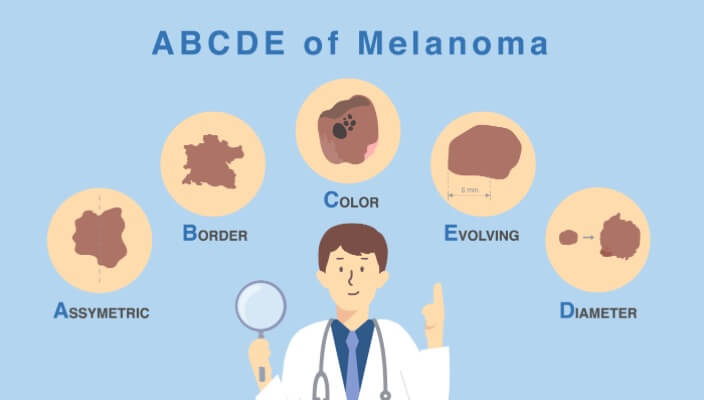
- Skin Cancer
- Skin Exams
Discover the ABCDEs of melanoma. Familiarize yourself with the five key indicators to aid in early detection and prompt medical attention for any suspicious moles or skin lesions.
Read MoreFeatured Products for Sun Protection
Check your local office for current stock!
Check your local office for current stock!
